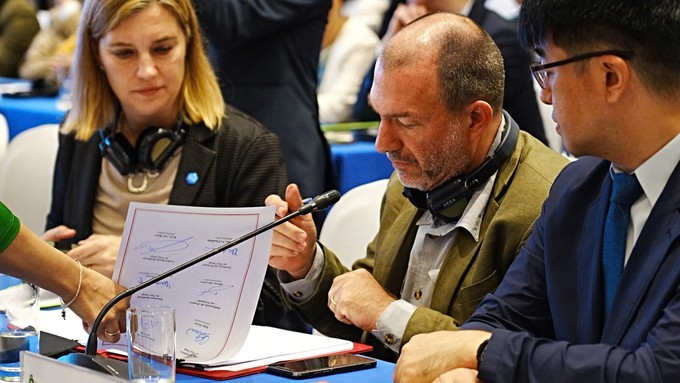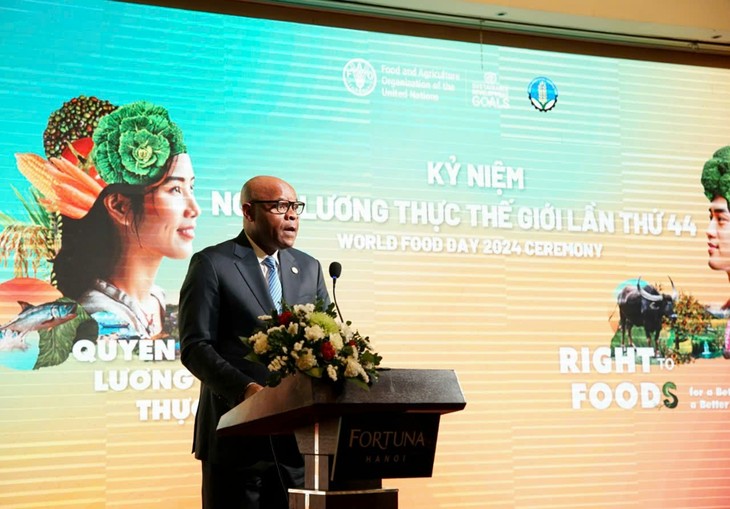(VOVWORLD) - Last Friday, Vietnam and 30 international partners signed the Partnership Agreement for Transparent, Responsible and Sustainable Food Systems Transformation (FST-Partnership) to enhance transparency, accountability, and sustainability in Vietnam's food systems. The overall objective of the agreement is to support Vietnam’s national food systems transformation pathways, contributing to national food security and achieving national and global sustainable development goals by 2030. On the sidelines of the signing ceremony, VOV talked to FAO Representative in Vietnam Rémi Nono Womdim.
 Three Vietnamese ministries and 30 domestic and foreign partners sign the FST-Partnership. (Photo: FAO) Three Vietnamese ministries and 30 domestic and foreign partners sign the FST-Partnership. (Photo: FAO) |
Bao Tram: Thank you, Mr. Womdim, for granting us this interview. How do you think this agreement will work for Vietnam’s food system?
Rémi Womdim: I’d like to congratulate the Vietnamese government for signing the Food System Transformation Partnership. This will be a key instrument to accelerate implementation of the National Action Plan on Food System Transformation with a vision to 2050. But the Food System Transformation Partnership is only one step. We need now to also ensure that the technical working groups are established and that the responsibilities of all partners are clearly established. So we’ll continue to work with the Ministry of Agriculture and Rural Development and all partners to ensure that we establish these groups and then make sure that we mobilize enough resources to implement the National Action Plan.
Bao Tram: We have mentioned Vietnam’s National Action Plan on Food System Transformation. How is it working so far, according to your opinion?
Rémi Womdim: We listened to various presentations at the event and see that Vietnam remains a powerhouse for agri-food exports. I won't go into details but we see that, for rice, cashews, and seafood, Vietnam is one of the world’s biggest exporters. That means the food system in Vietnam remains very strong. But just a month ago, Vietnam was hit hard by typhoon Yagi. That reminded us that food systems are vulnerable to climate variability and climate extremes. That’s why, now that we have this partnership agreement, we’re going to work together to ensure that the food system in Vietnam remains resilient and sustainable and ensure a better life for all farmers, women, girls, and youth.
 Mr. Rémi Nono Womdim, FAO Representative in Vietnam, speaks at the celebration ceremony for World Food Day 2024, Hanoi, October 18, 2024. (Photo: FAO) Mr. Rémi Nono Womdim, FAO Representative in Vietnam, speaks at the celebration ceremony for World Food Day 2024, Hanoi, October 18, 2024. (Photo: FAO) |
Bao Tram: The partnership agreement focuses on the urgent need for three things: building strategic partnerships, reshaping agriculture financing, and enhancing knowledge and capacity. How will FAO help Vietnam build a strong, sustainable food system?
Rémi Womdim: As you know, the strategic framework supports the 2030 agenda through the transformation to a more efficient, inclusive, resilient, and sustainable agri-food system for better production, better nutrition, a better environment, and a better life that leaves no one behind. So you can see that the National Action Plan approved by the government on March 28, 2023, is closely aligned with the FAO strategic framework for the period 2023-2031. FAO will continue to leverage innovation, technology, science, and data to ensure meaningful input to agri-food policies and decision making.
Second, FAO will also help the government formulate policies, strategies, and programs.
Third, FAO will continue to help mobilize financial resources for implementing the National Action Plan.
And fourth, FAO will continue to foster strategic partnerships, including the South-South and triangular cooperation partnerships. Today the Ministry of Agriculture mentioned triangular cooperation that has already been approved between Vietnam and Sierra Leone, between Vietnam and Angola, and ongoing discussions with other countries.
Bao Tram: Thank you, Mr. Rémi Nono Womdim, FAO Representative in Vietnam, for spending this time with us.
Rémi Womdim: Thank you very much for your questions.